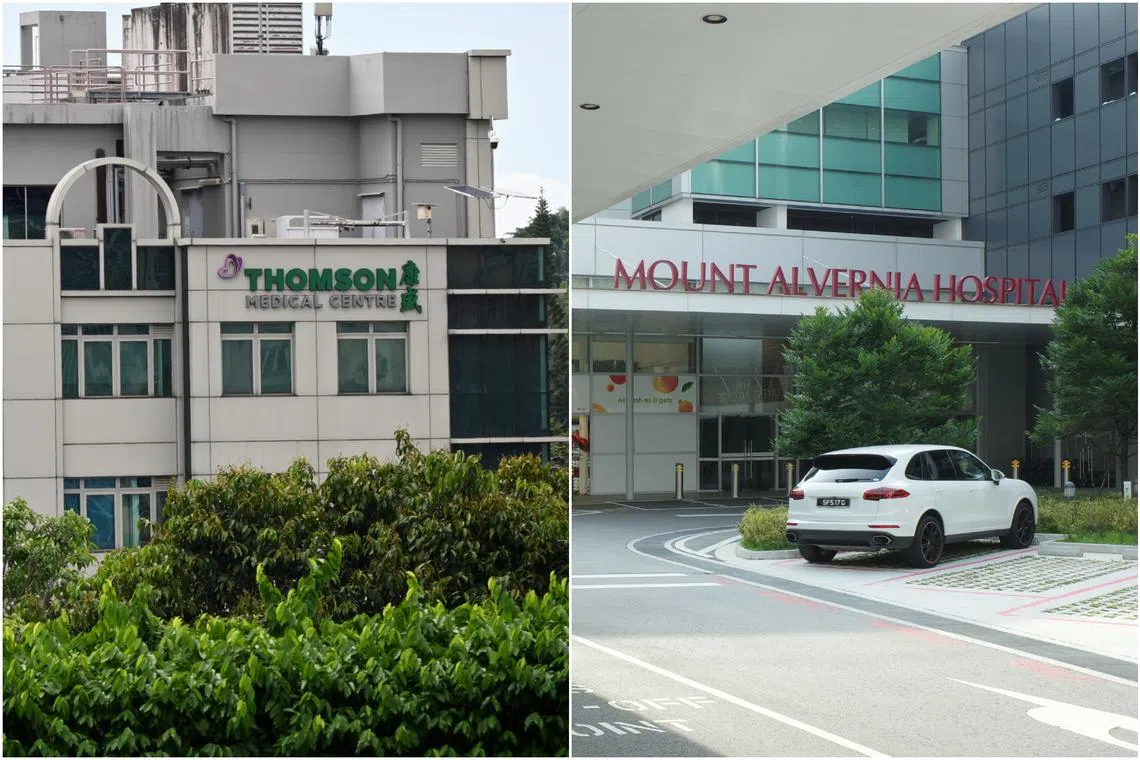Some S’pore private hospitals to delay connecting to national health repository of patient data
Sign up now: Get ST's newsletters delivered to your inbox

Thomson Medical and Mount Alvernia Hospital said they will face delays, citing challenges in organising the databases in their current electronic medical record systems to align with the formats of the National Electronic Health Record.
ST PHOTOS: KUA CHEE SIONG, BRIAN TEO
Follow topic:
SINGAPORE - Not all nine private hospitals in Singapore will contribute their patients’ health records to a national repository by the end of 2025 as they had earlier projected.
Two private hospitals – Thomson Medical and Mount Alvernia Hospital – told The Straits Times that they will face delays, citing challenges in organising the databases in their current electronic medical record systems to align with the formats of the National Electronic Health Record (NEHR).
Introduced in 2011, NEHR serves as a centralised repository for essential health data such as diagnoses, medications, allergies and laboratory reports.
With NEHR, patients do not need to repeat medical tests or take along paper medical reports and scans when visiting different healthcare providers.
A central repository also minimises the risk of patients being prescribed medication they are allergic to.
With the time saved, doctors can make better and faster decisions for their patients.
Public hospitals, which handle 90 per cent of the country’s acute hospital workload, have been using NEHR since 2011. Primary care providers such as polyclinics and general practitioner clinics on the Healthier SG initiative have also progressively been on board since then.
Participation by private healthcare providers has so far been voluntary, though this is set to change.
The Ministry of Health (MOH) plans to mandate nationwide contribution to the NEHR through the Health Information Bill (HIB). The Bill was initially scheduled to be tabled in Parliament in the first half of 2024, but has since been delayed.
In November 2024, all nine local private hospitals said they would be contributing patients’ health information to the NEHR
Gleneagles Hospital was the first to get on board in August. Within the first three days, the hospital uploaded data from 65 newly admitted patients.
IHH Healthcare Singapore – which manages Gleneagles, Mount Elizabeth, Mount Elizabeth Novena and Parkway East hospitals – said the remaining three hospitals are on track to complete integration by the end of 2025.
Raffles Hospital, too, said it expects to complete its integration with NEHR by end-2025.
Farrer Park Hospital told ST that it will be able to start data contribution in November.
Crawfurd Hospital said it is working closely with agencies and partners to meet the end-2025 deadline, but cited challenges including aligning the technical specifications of its systems with NEHR.
“As with most large-scale system integration projects, there are inherent challenges, such as aligning technical specifications, ensuring robust data security and adapting operational workflows,” said a spokesman for Crawfurd Hospital.
“On the data contribution front, we are also taking careful steps to safeguard accuracy, patient confidentiality, and compliance with data protection requirements.”
Thomson Medical said it will complete integration only by the second quarter of 2026.
Its spokeswoman said: “We recognise that rigorous testing and validation is required for secure and accurate data contribution and are committed to maintaining that standard of quality.”
Mount Alvernia Hospital, too, targets to start contributing to NEHR by the first quarter of 2026.
A spokeswoman said the key challenge is to align to the new data formats required by NEHR.
MOH’s data security requirements for providers contributing to or accessing NEHR are laid out in the Cyber and Data Security Guidelines for Healthcare Providers, which will become mandatory after the HIB is passed.
These mandatory security requirements include frequent and timely updates of systems and software, equipping staff with cyber-hygiene practices, as well as mandatory reporting of cyber-security incidents and data breaches.
Private hospitals contributing data to NEHR will need to comply with these requirements.
Private hospitals already have to comply with data protection requirements under the Healthcare Services Act and the Personal Data Protection Act.
But the HIB will specify what kind of sharing can take place through the NEHR. For instance, data sharing will be limited to authorised parties involved in the direct care of a patient.
Proper storage, reproduction and transmission of data will also be mandatory.

